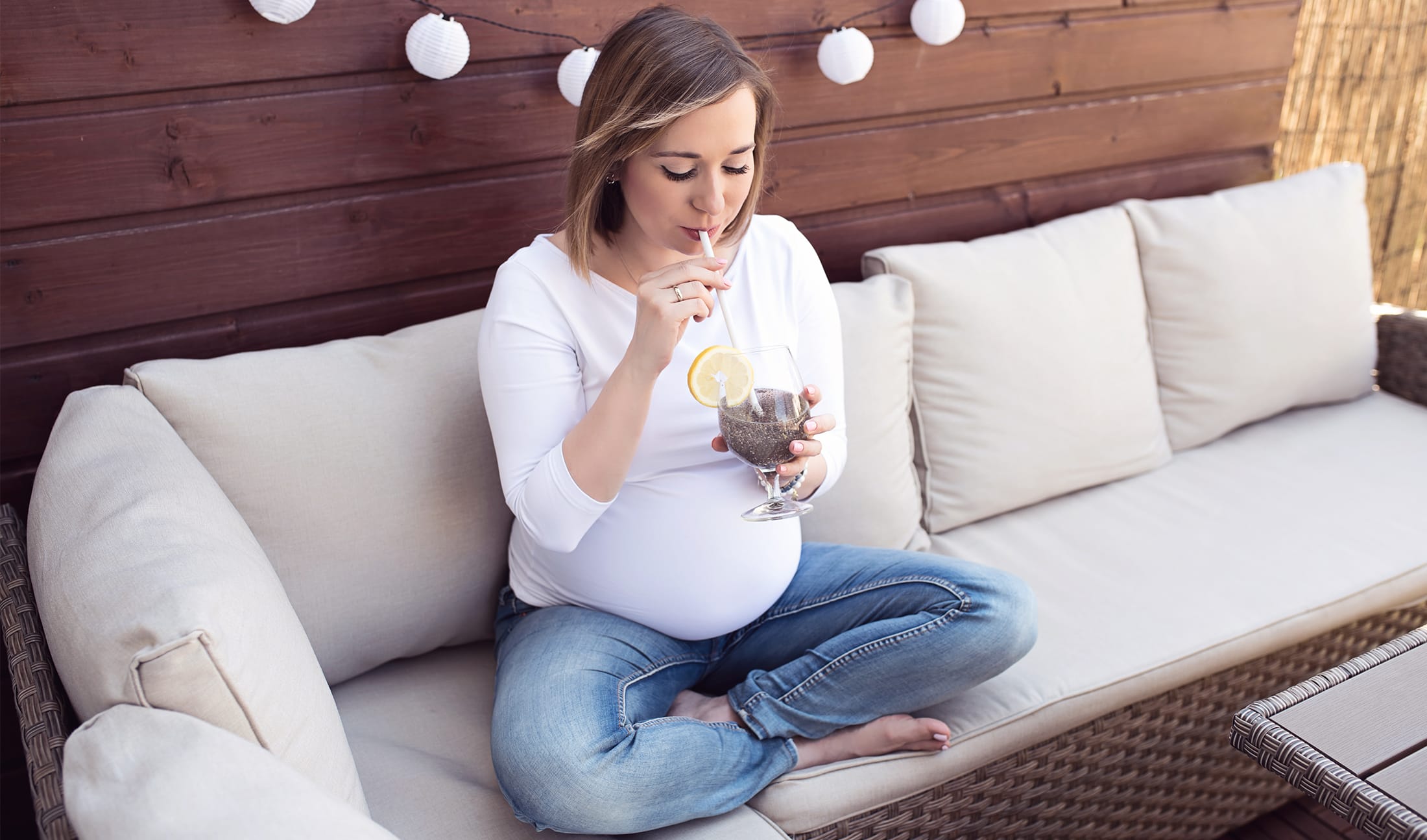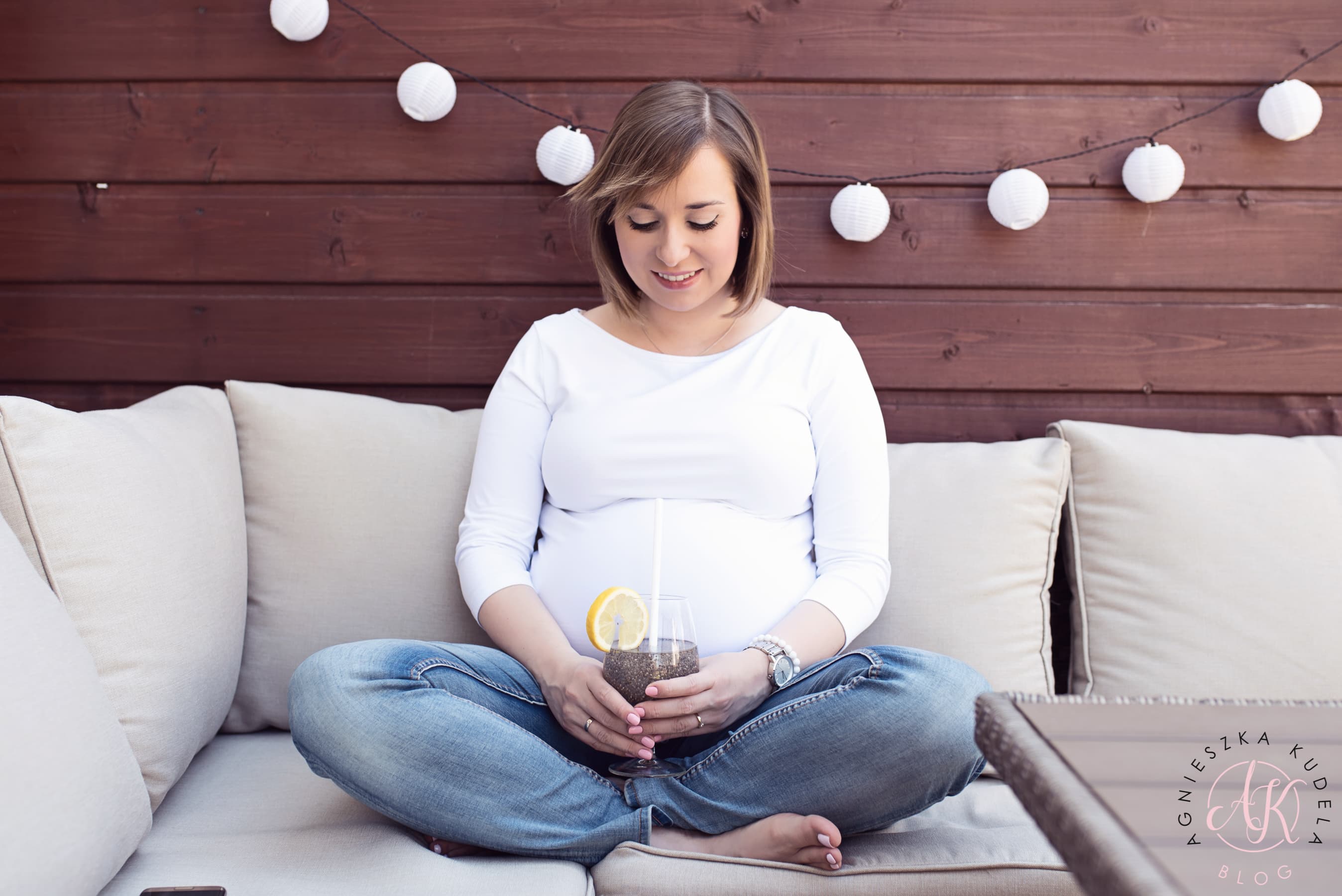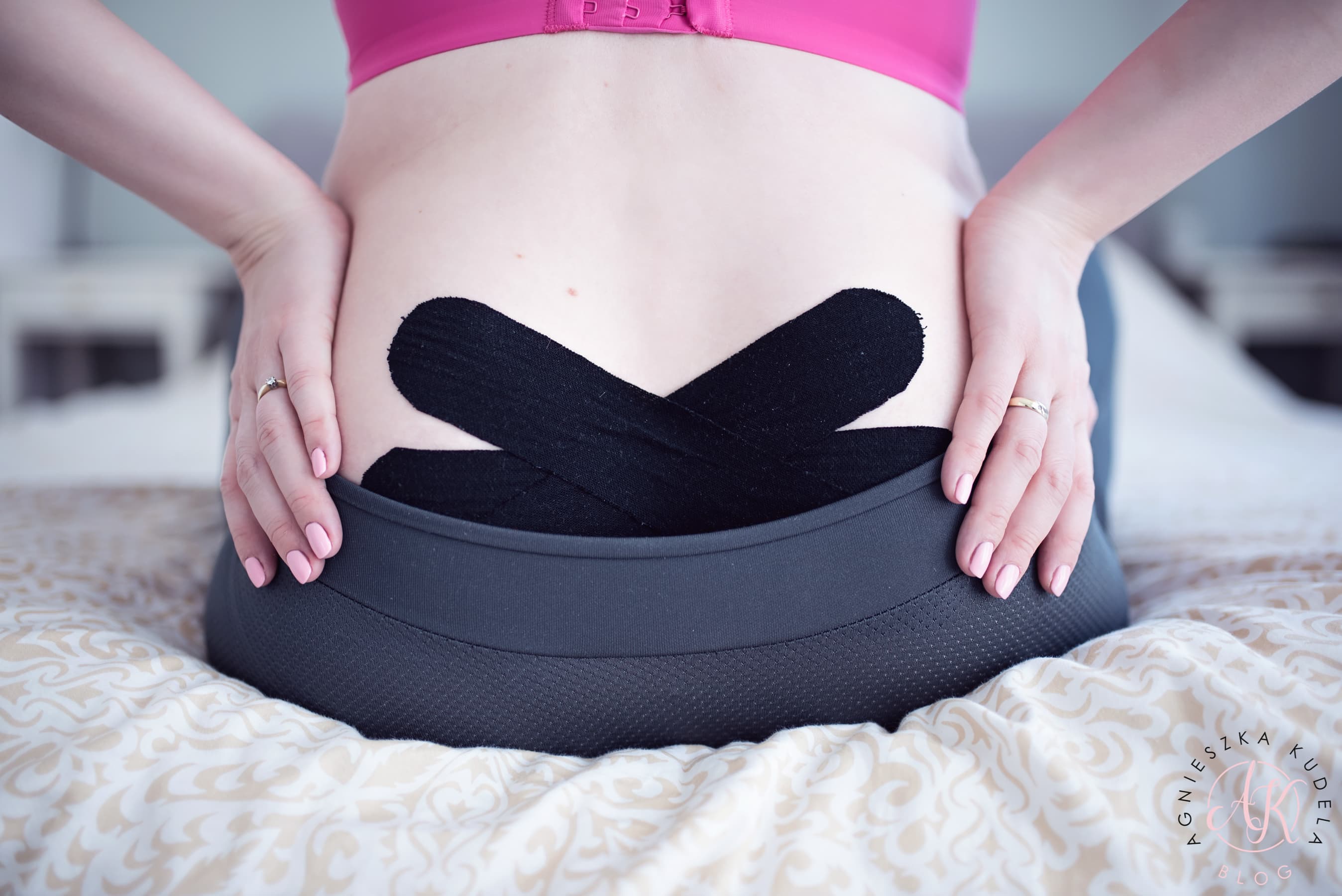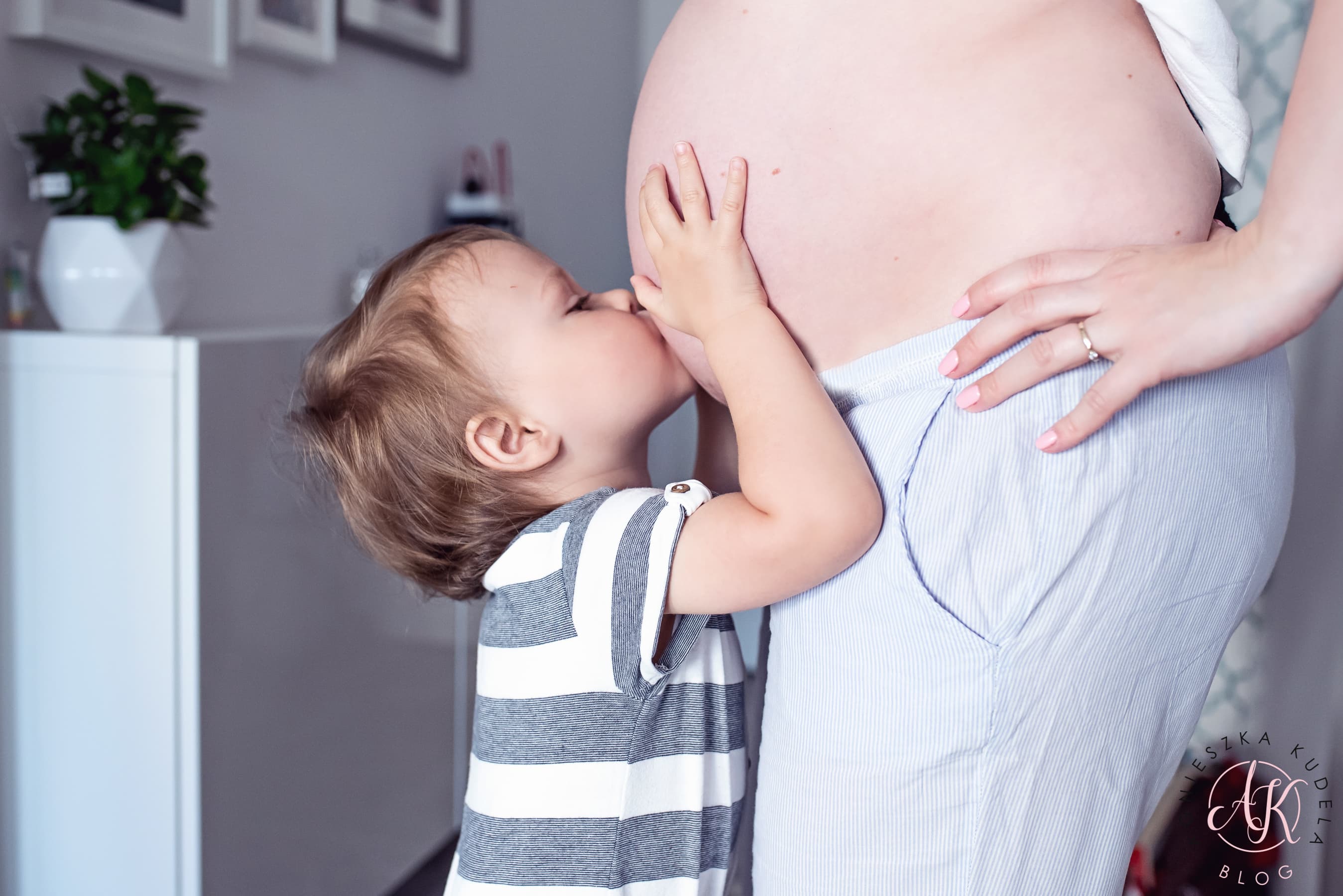My 10 ways to health in pregnancy

My whole adventure with a healthy lifestyle, healthy eating and healthy skin, hair and skin care began 4 years ago, when we decided to enlarge our family. Back then, I thought that my concern for health would be based on a few supplements and expensive anti-stretch mark creams. However, my curious nature has brought me to a completely different place and today I support my health and the baby growing in me in a completely different way than I planned (and it’s been 28 weeks – believe it?) Learn about my simple and natural ways to support health every day.
1. A glass of warm water with lemon in the morning

There is probably no better way to start the day than with a glass of warm water and a freshly squeezed lemon half into it. This mixture helps to cleanse the body (flushes out toxins), speeds up metabolism and improves digestion (thanks to fiber), helps with heartburn and indigestion, gives energy and supports our immunity (mainly due to the content of vitamin C). It’s best to drink it immediately after waking up, about half an hour before breakfast. It contains calcium and potassium, caring for your healthy heart, nervous system and brain. Lemon water also has an effect … deacidifying our body – despite its sour taste, it has an alkalizing effect on us.
2. Chia seeds



This is my favorite and most natural dietary “supplement”. I drink it twice a day: I put a tablespoon of chia seeds in a glass of warm (not hot) water and leave it for a while to drink my nutritional “bomb” later in the day.
What do I value chia seeds for the most? Even two large tablespoons of chia seeds (about 30 g) provide us with about 20% of the recommended daily intake of calcium, 30% manganese, 30% magnesium, 27% phosphorus, and as much as 11 g of fiber [source], which supports the beneficial bacterial flora in our intestines. They contain a lot of precious antioxidants [source], and their richness in calcium, magnesium, phosphorus and proteins wonderfully supports our and baby’s bones.
3. Beet juice
During pregnancy, women very often suffer from anemia (anemia). To prevent it, it is worth consuming beets from the very beginning of pregnancy. Despite the fact that compared to, for example, parsley, they are not such a rich source of iron at all, great they play a hematopoietic role, prevent (and even cure) anemia. The dyes they contain are very strong antioxidants that they increase the absorption of oxygen by our cells fourfold. For this they contain a lot of folic acid, directly supporting the development of our Child, and remove harmful harmful homocysteine from our body. [source]
Therefore, beetroot juice will fit perfectly into the diet of every pregnant woman, as well as those preparing for pregnancy. We usually squeeze our daily portion of juice on a slow-speed squeezer or in a stone vessel, we make juice from pickled beetroot with garlic – I will write about the miraculous properties of silage and recipes for this miracle on the next occasion. One thing is certain – already 2-3 weeks of drinking pickled beetroot juice every day were able to get me straight from a single-digit level of hemoglobin in the blood, they are certainly even better able to prevent anemia.
However, if you do not like, or you do not have the opportunity or time to prepare your own juices, in the Carrefour chain of stores we have discovered pickled beetroot juices in small glass bottles – the perfect portion of health for you and your baby for every day.
4. Water

It’s water flushes out toxins from our body – although it does not neutralize them, it supports the work of the kidneys and cleansing the body of harmful metabolic waste. Its deficiency causes us to feel tired, tired and weak, and even dizzy or trembling hands, leading to a drastic reduction in the level of electrolytes in our body.
Remember that during pregnancy you need to consume enough water for two of you (or maybe three?), Because a baby consists of 74-94% of water, and its natural environment is nothing else than water. Therefore, the appropriate amount of water that we should consume every day should be about 3 liters – take it easy, you will probably get one liter with food, and 2 you should drink. You will also take care of your proper digestion, provide necessary minerals and improve your well-being. [source]. That’s why I always try to have a glass and a bottle of water next to me. Summer is ahead of us, so I will probably consume more water to balance the amount excreted in the heat through the skin.
5. Vitamin D
This life-giving vitamin helps build your muscles and bones, as well as your baby’s – is responsible for the proper calcium management in our body. Its deficiency can lead to weaker bones in you and your child, and also leads to more frequent allergies in children.
During pregnancy (and not only), I certainly do not sunbathe for hours (I do not expose my face to the sun at all), but if only the weather allows it, I try to expose myself to full sun for 20 minutes each sunny day. Supposedly 15 minutes of arms and legs exposure in the sun can cover our daily demand for vitamin D. This is another reason to go for a family walk every day.
On the other days (i.e. during the first two trimesters almost every day) I take the appropriate dose of vitamin D in droplets.
How to determine the right dose of supplemented vitamin D?
Get your vitamin D levels tested at the next blood test and check with your doctor what dose of vitamin D is right for you – don’t forget to tell him about your habits. You need the right dose of vitamin D for the proper calcium metabolism during pregnancy, but also for the baby [“The Book of Pregnancy”, W. and M. Sears].
6. Folic acid
It is necessary for proper development of your baby’s spinal cord. Did you know that the fetal nerve coil closes already at 3-4 during pregnancy week? That is why you should take care of getting the right amount of folic acid at the stage of applying for a child. Too low folic acid is also a cause of prematurity or behavioral problems in a child, that’s why we must take care of its proper level throughout the whole pregnancy [The Book of Pregnancy, W. and M. Sears].
Despite the diet rich in folic acid, as prescribed by the doctor throughout the pregnancy I also provide it in the form of supplements. What dose to use? Which acid is best to choose? Set it all up with your attending physician.
7. Oils
Every day I eat the so-called cold. “Good fats”, that is coconut or linseed oil. Each time I choose vegetable fats that are unrefined and cold pressed – only these retain maximum nutritional value. You can also find healthy fats nut oil, olive oil and fish oil (on condition that it has been tested for heavy metals and does not have them or has them in quantities that do not endanger your and your child’s health).
Remember that the consumption of healthy fats brings benefits to your health, and above all, to your baby’s health – you cannot overcome their good effects by eating unhealthy fats. So your blacklist should include “bad fats“Which cross the placenta and block the cell membrane receptors in your baby, which results in fewer connections between your baby’s brain cells. Unhealthy fats include:
- hardened vegetable fats (so-called trans fats) – can block the action of the enzyme, thanks to which your body can convert Omega-3 acids into omega-3 DHA acid, which is extremely important for the development of your child’s brain. What is the most popular hard fat? Of course, margarine, no matter what other wonderful ingredients you add to it, shouldn’t be in your diet;
- Palm oil – firstly, of all fats, it is the most contaminated with pesticides, and secondly, it is very poor in valuable acids [“The Book of Pregnancy”, W. and M. Sears].
8. Motion

Every time I dreamed of an active pregnancy, through the eyes of my imagination I saw myself beautiful, slim, brave and working, preferably until the very day of childbirth, exercising every day in fashionable clothes with celebrities on DVD on my own carpet … Unfortunately, few of my dreams in this topic have come true . I admit, at first I had huge complexes, especially after being forced to lie down for several weeks, which I did in every pregnancy, after which I got breathless going up the stairs to the first floor. But I decided to take this activity with my own measure and after consulting a doctor, taking into account all my health limitations, set your own “original training program” – even if he is exhausted by a 10-minute turtle walk or two lengths of the pool. I try to be as active as I can and get as much joy out of it as possible. Although my possibilities are symbolic, every day I try to plan a mini-walk, in bad weather, for example to the store. I don’t want to neglect the traffic at all costs. Intuitively, I feel that a lying lifestyle has only disadvantages – low mood, decline in form and pain are progressing rapidly. So joy brings me every, even the smallest activity.
Bed regime? More and more often I come across the fact that the doctors who look after me, and in each pregnancy I meet many of them, less and less as a medicine for threatening miscarriage or shortening of the cervix, they prescribe “bed regimen”, but rather recommend “saving” in the maxi version. She wrote about it in a very interesting way MamaGinekolog.
9. Physiotherapy and kinesiotaping

I admit that although pregnancy is a long-awaited and dream state for me, unfortunately my motor system seems to be completely unsuited to it and it gives me a lot of pain again. Therefore, instead of curing, I decided to prevent and already in the sixth month, I applied to… a physiotherapist. We see each other once a week, and in addition to the massage of excessively tense muscles that cause pain, especially in the pelvic and back, my physiotherapist uses kinesiotaping – it’s sticking to the skin, on selected parts of the body, flexible, waterproof, breathable cotton patches that soothe pain. I am after a few such meetings and I already feel a big difference, I will describe you fully … after the delivery, because we will work together to regain shape afterwards.
10. Care for the skin
It may be a surprise for you, but I do not use a single cosmetic dedicated to pregnant women. Which does not mean that I do not use them at all, or do I use the same cosmetics as before pregnancy. The story of how I stopped trusting brands and started trusting compositions I’ll tell you on another occasion, and today I’ll just tell you that I found much more valuable ingredients in “ordinary” cosmetics or oils. I do not see the need to buy expensive cosmetic oils based on petroleum (paraffin oil is, for example, the main ingredient of many popular anti-stretch mark oils, many of them also contain resinoids, which should also be avoided during pregnancy) or expensive creams, which, although dedicated to women during pregnancy, they can be harmful to the developing child – as a curiosity, you can check which well-known brands produce creams dedicated to pregnant women with toxic ingredients such as Polyacrylamide – a preservative, formaldehyde derivative, toxic substance – o here.
I am aware of that not all beneficial cosmetic ingredients are desirable during pregnancy and breastfeeding, so before applying any cream, lotion or body mousse, I check that the list of substances it contains are not inadvisable for pregnant women. You will find such a list on my favorite cosmetics blog.

Here are my 10 ways to take care of your baby’s health and yours through these extraordinary 9 months. If they are not on your list, maybe they will become an inspiration for you to take care of New Life and about yourself. If you liked my text, I will be very pleased if you like it or share it to share with others.

